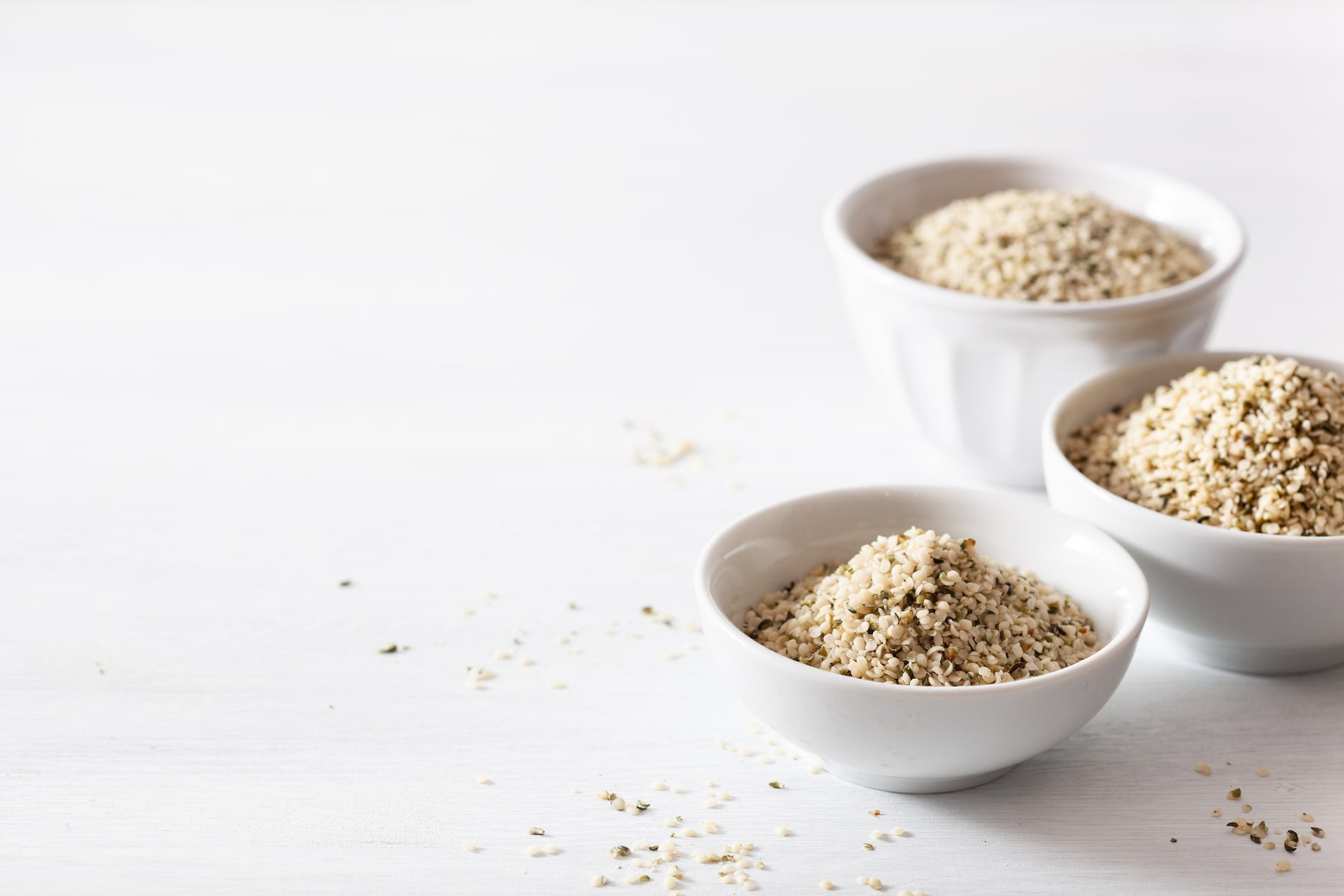Are Hemp Hearts Keto? A Ketogenic Guide

Keto is one of many food lifestyles that promises to help its followers lose weight and improve their natural energy levels. Keto favors fat and protein macros above carbohydrates, and many of the foods we eat every day are carbohydrates.
So, where do foods like hemp hearts fall within keto’s rules?
What Is a Ketogenic Diet?
Many diets emphasize reducing fat consumption or reducing carbohydrate consumption. Keto is a little different. The ketogenic diet calls for eliminating almost all carbs from your diet, but eating a substantial amount of fat.
Since keto gets rid of most carbs, the body has to find another source of energy. When you’re losing weight or engaging in a strenuous cardio workout, your body begins to burn its stores of fat to keep itself operating at high capacity.
The theory behind eating a very minimal amount of carbohydrates and a substantial amount of fat is to change your body’s first choice for an energy source. When you’re primed to burn fat, your body is more likely to use your fat to keep you powered.
When your body is running on energy from fat, the process is referred to as being in a state of ketosis. Ketones are the byproduct of fat your body is burning off, and they’re expelled through your urine.
That’s why so many people pee in a cup and test their urine with a strip when they’re on a keto diet. The strip tests for ketones and gives them feedback, allowing them to see whether or not their body is responding the way they want it to respond.
How Do Carbohydrates Work?
The idea behind the ketogenic diet is to change the way your body is inclined to work. Your body naturally uses carbs for energy, which may be part of the reason why you crave a burrito after a workout.
Carbohydrates help you feel full, and they play a role in the function of every organ in the human body.
Your body wants to replenish its stores of natural sugars and energy, and carbs are its first choice. The body likes to store carbs for its continued use, and people who eat more carbohydrates than necessary will inevitably wind up a little heavier than they’d prefer to be.
This doesn’t mean that carbohydrates are bad for you, but it’s worth noting that not all carbohydrates are created equal.
Carbohydrates aren’t the enemy as long as they’re unrefined.The carbohydrates in a whole bag of chips won’t do as much for your body as the carbohydrates in a sweet potato.
Refined and processed carbohydrates lose nearly everything positive they had to offer your body outside of plain old calories.
Whole-grain carbs and carbs from fruits and vegetables provide your body with valuable fiber and all the vitamins and minerals that the plant contains. That’s why people on the keto diet choose to use their lower carb allotment on beneficial carbohydrates from whole sources.
What Is the Right Macro Balance for Keto?
You’ll get no less than a million different answers to this question. Everyone seems to have their own theory.
Some people are strict with a specific macronutrient balance, while others use the “lazy keto” method, using logic and their best judgment to loosely follow keto principles.
- Protein – 10% to 20% of total daily calories
- Fat -- 70% to 80% of total daily calories
- Carbohydrates – 5% to 10% of total daily calories
Many people will also say that keto works for anything below 50 grams of net carbs per day. A net carb is the total carbohydrates of a food minus its total fiber.
Fiber is a carbohydrate that your body cannot digest, so it doesn’t actually count as a carb. The body uses fiber to help eliminate waste without deriving any nutritional value from it.
When you subtract a food’s fiber from its carbs, you’ll land at the actual amount of carbohydrates in a food that your body can use.
The reason why there are so many methods and different ways to calculate macros is simple: keto doesn’t work the same way for everyone. Each depends on a day’s eating, and ketosis is often situational.
That’s why people buy ketosis test strips. They pee on a stick and the stick tells them whether or not their body is responding the way they want it to. You won’t know what your carb limit is without a little trial and error.
You’ll have to log the macros for everything you eat and consistently test for ketones to find out where you sit.
Is Keto Healthy?
Anything can be healthy or unhealthy. Although most people use a ketogenic diet with the intention to help improve their health, there’s a right way and a wrong way to go about anything. A whole bag of organic sugar is obviously vegan and organic, but there’s nothing healthy about eating it. Keto works the same way.
In order for keto to be healthy, you need to make the right choices on keto. If you ate nothing but fried bacon topped with butter, you’d be following keto. Your body would also suffer for it. You need to make balanced choices. Incorporating a variety of lean proteins and incorporating fat from healthy sources is key to maintaining your health and meeting your body’s needs when you adopt a keto lifestyle.
Healthy omega fats, like those found in hemp seed oil, are a better choice than the fats found in processed vegetable oil. Lean protein from fatty fish is better than the fats that naturally occur in red meat. However, you still need to be mindful of what you put on your plate.
Can You Lose Weight on Keto?
You can lose weight on keto, but you can lose weight on any other diet or lifestyle plan. It’s all about making the right choices.
In order to lose weight, your body needs to use more energy than it takes in. If you’re eating more than your daily caloric needs, you’ll gain weight. If you’re eating your exact daily caloric needs, you’ll maintain weight.
We’d all love a quick fix. It would be great to find a simple diet that helps weight melt off without much effort. We’d all be happy and healthy. Unfortunately, losing weight always comes down to calories in, calories out.
Calculating Your BMR
You need to calculate your basal metabolic rate. This number determines how many calories your body needs to power basic functions. That’s the number you’d need to maintain your weight without meaningful exercise. In order to lose weight, you need to eat less than that number. Exercise will increase this caloric deficit, leading to faster results.
Eat Fewer Calories Than Your Body Needs
In order to lose weight on keto, you’ll need to eat fewer calories than your body needs for maintenance while staying within your ideal macro ratio to maintain ketosis. You won’t lose weight by eating 3,000 calories of fat a day. You’ll likely lose weight eating 1,200 to 1,600 calories a day, especially if you’re exercising on a regular basis.
If you try keto and it doesn’t help you reach your weight loss goals, excessive calories are likely the culprit. If you’re only considering keto because you want to lose weight, you have some more things to think about.
If you try keto and you totally hate it, you don’t need to stay married to it. In fact, you don’t need to stay married to a particular diet or lifestyle at all. You have the freedom to do what works.
As long as you’re eating a balanced diet, getting adequate exercise, and maintaining a caloric deficit, you’re going to see results. Your health should come first, but you should also enjoy the things you’re eating and have an easy time navigating your daily menus. All it takes is making healthier food choices. For example, you can add salad, cereal, or yogurt, or blend them into smoothies.
What are Hemp Hearts?
Hemp hearts are hulled hemp seeds. This means they’ve been taken out of their tiny shells. Hemp hearts provide a significant amount of protein, many vital vitamins and minerals, and a modest amount of dietary fat with each serving.
One 3 TBSP Serving of evo hemp Hearts includes:
- 170 calories
- 13 grams of fat
- 10 grams of protein
- 3 grams of carbohydrates
- 3 grams of fiber
- Nutrients and Vitamins, such as calcium, potassium, magnesium, thiamin, vitamin B6, iron, phosphorus, zinc, and manganese
Since hemp hearts contain equal amounts of carbohydrates and fiber, their total net carbs per serving works out to zero.
Hemp hearts are a valuable addition to any idet. They’re a high quality source of protein, vitamins, and minerals. With 10 grams of protein per 170 calories, they’re a valuable source of plant based protein that’s easy to incorporate into many recipes.
Hemp hearts don’t ordinarily contain any CBD, or any other cannabinoids for that matter. If you’re hesitant to eat hemp hearts because you’re worried about what their effects may be, they’re just good old fashioned nourishment.
There are evo hemp Hearts with CBD added, and these can come in handy if you’re working out on keto. Many people love the benefits of CBD as a post workout recovery tool. CBD is soothing and relaxing. After a hard workout, you just want to chill and rest up for a while.
Use CBD hemp hearts when you’re looking to relax after a day of slaying at the gym.
Are Hemp Hearts Keto?
Since hemp hearts contain 0 grams of net carbs, 13 grams of healthy natural fats, and 10 grams of protein per serving, they’re an excellent fit for a keto diet. They’re over 70% calories from fat, which is the percentage that most people look for when choosing keto-friendly foods.
In fact, they’re an excellent fit for any diet. Since they’re vegan and nutritious, virtually everyone can enjoy them. They’re easy to sprinkle on top of your favorite foods or mix into dishes to add protein, fiber, healthy fats, vitamins, and minerals. They’re a little crunchy boost with a pop of earthy flavor.
How to Incorporate Hemp Hearts into a Keto Meal Plan
Most people on a keto diet use hemp hearts to replace grains (like oat-free oatmeal), add fat to a dish (like with fat bombs), or add texture to their meals.
Hemp Heart Keto Oatmeal
Oatmeal is a satisfying, comforting, and filling breakfast. It’s also practically 200% carbs, which knocks it right off the keto menu. Keto dieters have found a workaround. There may be no oats in this recipe, but it’s definitely still a meal.
By making a fat and protein heavy oatmeal alternative, you can still scratch your itch for a warm and comforting breakfast without breaking ketosis
- ¼ cup hemp hearts
- ¼ cup chia seeds
- 1 cup almond milk
- One tablespoon flaxseed
- Two tablespoons of keto-friendly sweetener, like yacon syrup, monk fruit, or erythritol
All you need to do is drop all the ingredients into a pan and simmer it on medium heat for five to ten minutes, stirring occasionally. A dash of cinnamon or pumpkin pie spice perfectly complements its earthy flavor.
Chocolate Hemp Heart Keto Fat Bombs
Fat bombs are the keto version of snacks. Most of the things people snack on are naturally high in carbs. Fat bombs serve as a grab-and-go keto-friendly alternative for movie nights or hanging out with keto friends.
These keto fat bombs taste like chocolate cheesecake bites, and the crunch from the hemp seeds replicates the texture of graham cracker cheesecake crust.
- 8 oz cream cheese
- ½ cup melted coconut oil
- ¼ cup heavy cream or full-fat coconut cream
- Two teaspoons vanilla extract or almond extract
- Three tablespoons keto sweetener like yacon syrup or erythritol
- Two tablespoons dark cocoa powder
- Three tablespoons hemp seeds
Combine the cream cheese, coconut oil, cream, extract, and sweetener in a bowl or a stand mixer. Beat until fully incorporated and smooth. Fill cake pop molds, truffle molds, or a mini muffin pan with small serving sizes of the cheesecake mixture. Dust with cocoa powder and sprinkle with hemp seeds.
Put them in the freezer for about 45 minutes to harden, and you’re ready to go.
Enjoy Hemp on Keto
If you’ve decided to give the keto lifestyle a shot, we’re behind you. Find some keto foods you enjoy and reach your wellness goals.
At evo hemp, we’re always here to provide you with keto friendly hemp products for your next recipe.
Sources
Carbohydrates, Proteins, Fats, and Blood Sugar | Michigan Medicine
Carbohydrates: How carbs fit into a healthy diet | Mayo Clinic
Is the Keto Diet Safe? What are the Risks? | UChicago Medicine



